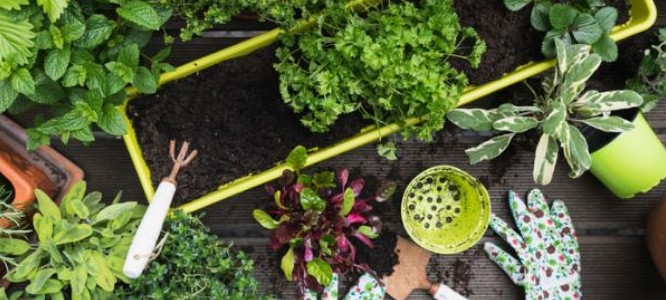
Gardening Knowledge from the Field of Master Mind Herbs (MMHRB)
Shared from the research of: Joseph Mercado
Article Author: Genesis – The Lost Herbs
Content Contributor: Nicole Apelian
To: Article Reader
Blog Post #962
Re: Herbs That Should Not Be Planted Together
Date and Time: Tuesday, June 2, 2020 at 11:37 p.m.
Dear Article Reader,
You’ve probably heard of companion planting, but what about the opposite?
Which herbs should be kept separated from each other, never to meet? You might be surprised to learn that some herbs just don’t get along at all and should be planted far apart.
As you plan your herb garden, be sure to check which herbs go best together and which should be kept apart. With the right spacing and companion planting, you’ll notice better growth throughout your garden.
Before we get started on specific herbs, keep in mind that you’ll want to separate herbs that prefer water from those that need drier soil. This is something that many beginning gardeners miss and it can be disastrous for plants.
For example, an aloe vera plant next to chives will wilt and rot away if you keep the chives happy with the amount of watering. Likewise, the chives will dry up and die if you keep the aloe happy with minimal liquid.
Even herbs that prefer the same types of soil and water aren’t always compatible. The following plants should be placed very carefully.
Fennel:
Fennel has long been touted as a cure for belly-aches and nausea, as well as easing gas and intestinal cramps. This stomach-soothing herb needs to be planted away from nearly every other plant, herbal or otherwise.
It can taint the flavor of other plants, including vegetables. Unfortunately, fennel also tends to cause other herbs to fail in growing. You’ll want to plant this beneficial herb in a completely separate container far from anything else.
Rue:
Often used as a natural anti-inflammatory, as well as remedy for parasites and diarrhea, rue is very useful for a range of injuries, and aches and pains. However, it doesn’t get along well with certain other plants.
It shouldn’t be planted in your vegetable garden at all, but even in your herb garden, it can cause trouble. Keep it far from any basil plants or sage that you may have growing in the herb garden, as it will cause them to grow poorly.
Mint:
Mint is most often used to soothe the stomach and to boost energy naturally. It’s also useful for those suffering from bad breath and may even aid in weight loss.
Anyone who has ever planted mint knows just how fast it can grow. This aggressive growth is what causes the most issues when it comes to planting it with other herbs.
The mint will rapidly take over and stunt the growth of the rest of your garden. To protect your other herbs, it’s a good idea to limit mint to a container. If you do plant it in your garden, use a surround to prevent it from creeping throughout the garden.
Dill:
You’re probably most familiar with dill from its unique flavor in dill pickles and its treatment of colds and flus. It’s a great companion plant for many plants, but it doesn’t allow caraway or fennel to grow well.
If planted too close to the other herbs, you’ll notice that they tend to stay stunted or may even wither. You should also keep dill away from your lavender, as it can affect the herb’s growth.
Sage:
Another wonderful medicinal herb, sage is usually a good option to have in your garden. It is often used to help reduce blood sugar levels and to lower cholesterol, as well as for menopause symptom relief.
There are a number of reasons to include the flat-leafed herb in your arsenal. However, if you’re growing chives or onions, you should plan to keep the sage plants on the other side of the herb bed to prevent any potential problems.
Garlic:
Used for a variety of medicinal reasons, including preventing parasites, garlic is a must have in your herb garden. Most people know it best as a food flavoring, but it also has a number of medicinal benefits, including boosting the immune system and reducing the risk of heart disease.
You should plant several of these plants, but keep them away from your parsley and sage. Garlic is known to stunt the growth of these plants, so it’s best planted on the opposite side of the herb bed from them.
Rosemary:
You may want some rosemary in your garden just for cooking with, but medicinally, it’s been used to improve memory and protect the brain from aging effects. It’s also wonderful for digestive issues. While this great smelling herb works well with other plants like sage and bay, it doesn’t play well with all other herbs.
For example, chives and cilantro won’t grow well next to rosemary. This plant needs drier soil than most and that means most other herbs grown with it will wilt and die from lack of water.
Oregano:
With its natural antibiotic and antiviral properties, oregano is an important medicinal plant to keep in your garden. The leaves can be used to help reduce inflammation and may even help prevent cancer. That being said, it’s also very invasive, much like mint.
If you’re not careful, it will rapidly take over everything and block out your other herbs. It’s best to keep your oregano in a pot or blocked off from the rest of the garden to prevent issues.
Basil:
Best known for its use in pasta and pizza, basil is also good for stomach upsets, parasite infections, and may even ease digestion while increasing gut health. Basil can be grown with nearly anything, though is should definitely be placed next to tomatoes when possible.
When it comes to other herbs, most of them do just fine next to this tasty Italian plant. However, sage will not grow well in proximity to basil, so avoid this duo in your herb bed.
If you have a dedicated herb bed, make sure it’s large enough to keep your incompatible plants at least three feet away from each other. Some plants, such as oregano, mint, wormwood and fennel, should be kept in separate beds or even pots, so they won’t cause ill effects in the other herbs you’ve cultivated.
Growing herbs may be the best way to keep your own fresh remedies at home, but you’ll get more benefit from them when you grow them correctly. By avoiding the wrong sort of companion planting, you’ll see better growth and flavor.
Content Source: TheLostHerbs.com

 Email Us a Message
Email Us a Message 

Please send us an email message below and we will serve you momentarily.



 Fly Over to the MMU Facebook Page with Hoot
Fly Over to the MMU Facebook Page with Hoot 

 Join the MMU Facebook Group Today
Join the MMU Facebook Group Today 